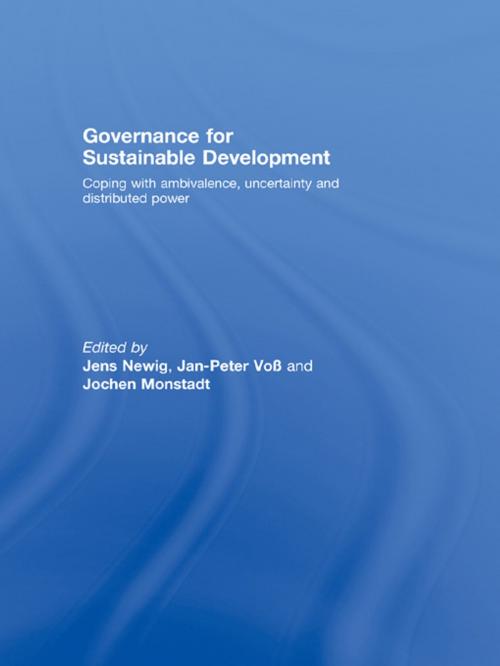Governance for Sustainable Development
Coping with ambivalence, uncertainty and distributed power
Nonfiction, Science & Nature, Science, Earth Sciences, Geography, Social & Cultural Studies, Social Science, Human Geography| Author: | ISBN: | 9781317991496 | |
| Publisher: | Taylor and Francis | Publication: | September 13, 2013 |
| Imprint: | Routledge | Language: | English |
| Author: | |
| ISBN: | 9781317991496 |
| Publisher: | Taylor and Francis |
| Publication: | September 13, 2013 |
| Imprint: | Routledge |
| Language: | English |
Sustainable development stirs up debate about the capacities of political steering and governance. The complexity of the task expounds limits of steering in three dimensions: goals, knowledge, and power: Sustainability goals are subject to changing and controversial risk perceptions, values and interests. Moreover, knowledge of the coupled dynamics of society, technology and nature is limited. Finally, the power to shape structural change in society and technology is distributed across a multitude of actors and societal subsystems. Steering attempts therefore have to cope with conflict and ambivalence, with uncertainty, and with a lack of central control; and they have to face the necessity of coordinating different actor groups and social networks.
This volume explores steering strategies and governance arrangements for sustainable development with a view to these problem dimensions. The contributions by authors from various disciplines approach these challenges from different conceptual angles, ranging from positivist, managerial up to post-modern, constructivist perspectives. By combining theoretical reflections with insights from empirical research in European and American contexts, the volume maps out conditions and identifies approaches which both reflect the limits of steering and reveal options for constructively taking up the task of sustainable development in science and practice.
Sustainable development stirs up debate about the capacities of political steering and governance. The complexity of the task expounds limits of steering in three dimensions: goals, knowledge, and power: Sustainability goals are subject to changing and controversial risk perceptions, values and interests. Moreover, knowledge of the coupled dynamics of society, technology and nature is limited. Finally, the power to shape structural change in society and technology is distributed across a multitude of actors and societal subsystems. Steering attempts therefore have to cope with conflict and ambivalence, with uncertainty, and with a lack of central control; and they have to face the necessity of coordinating different actor groups and social networks.
This volume explores steering strategies and governance arrangements for sustainable development with a view to these problem dimensions. The contributions by authors from various disciplines approach these challenges from different conceptual angles, ranging from positivist, managerial up to post-modern, constructivist perspectives. By combining theoretical reflections with insights from empirical research in European and American contexts, the volume maps out conditions and identifies approaches which both reflect the limits of steering and reveal options for constructively taking up the task of sustainable development in science and practice.















